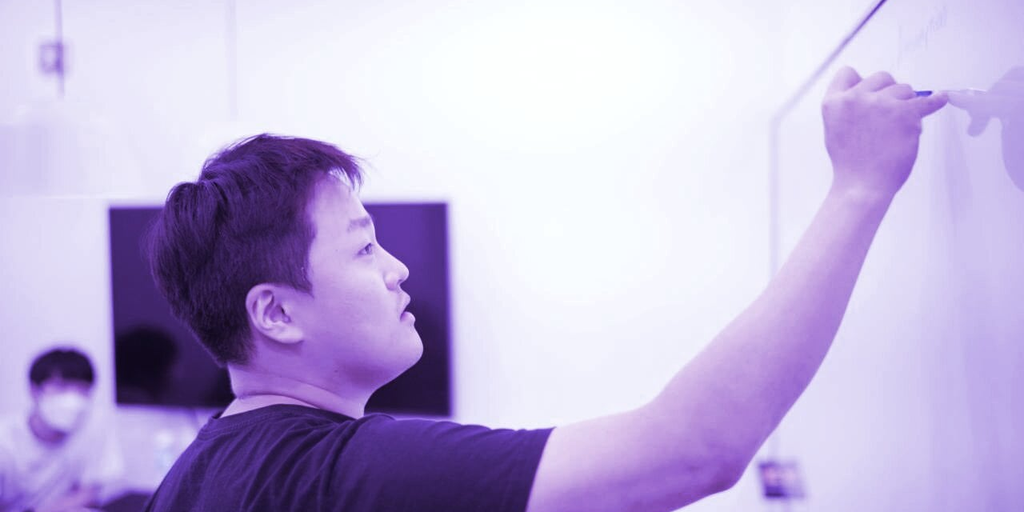
Terraform Labs CEO Do Kwon’s location is still “unknown,” according to the Securities and Exchange Commission’s lawsuit, which claims he fabricated details to supercharge growth on the Terra ecosystem before its collapse in 2022.
Do Kwon co-founded Terraform Labs with Daniel Shin in 2018, a year before they launched the Terra network. The company also created TerraUSD (UST), an algorithmic stablecoin. By April 2022, its market capitalization had reached $17 billion and it unseated Binance USD as the third-largest stablecoin in circulation, according to CoinGecko.
But in May, UST lost its dollar peg. In a matter of days, $40 billion worth of value had been wiped out and the Terra network was shut down.
Now the SEC is bringing down the hammer. Here’s what’s in its lawsuit.
10,000 Bitcoin
The SEC alleges many of the claims Kwon made about Terra were simply made up. Among the more startling claims, the Commission alleges that Kwon transferred 10,000 Bitcoin (BTC) out of Terraform Labs and Luna Foundation Guard (LFG) to a Swiss bank account. That’s a stash worth almost $250 million at today’s prices.
According to the SEC, Kwon has been transferring BTC from wallets belonging to TerraForm and LFG to a Swiss bank account, where he’s been converting it to cash.
“Between June 2022 and the date of this complaint, over $100 million in fiat currency has been withdrawn from that Swiss bank,” the SEC writes in its lawsuit.
If true, it stands in stark contrast to the investors who lost huge amounts of money when UST crashed last year. The SEC lawsuit specifically mentions a pharmacist in California who borrowed $400,000 against their home to purchase UST and a painter in Vermont who invested $20,000 that was otherwise earmarked for his son’s college tuition.
The Chai lie
On the road to becoming the third-largest stablecoin, Kwon made some big claims about the Terra network and UST.
But Terra’s partnership with payments app Chai didn’t involve the kind of integration that Kwon promised, the SEC wrote in its lawsuit. It’s a big allegation to make considering that Chai founder Daniel Shin also cofounded Terraform with Kwon in 2018.
In 2019, Terra болгон өнөктөштүгүн жарыялады with Chai, writing in a blog post it would “rebuild the payments stack on the blockchain to simplify the legacy payment system and provide transaction fees at a discounted rate to merchants.”
Компания бул келишим “миллиондогон, миллиарддаган транзакциялардын көлөмүн” кайра иштетүүгө алып келет деп эсептейт.
The SEC alleges that Terra never replaced Chai’s payment systems.
"Чай төлөмдөрү төлөмдөрдү иштеп чыгуу жана жөнгө салуу үчүн Terraform blockchain колдонгон эмес", - деп жазган SEC өзүнүн даттануусунда. "Тескерисинче, айыпталуучулар Chai төлөмдөрүн Terraform блокчейнине алдоо жолу менен кайталашты, алар Terraform блокчейнинде болуп жаткандай көрүнсүн, чындыгында Chai төлөмдөрү салттуу ыкмалар аркылуу жасалган."
Members of the industry have since said that it was a poorly kept secret that Chai wasn’t really using Terra to facilitate payments.
«Fraud case is rock solid. Chai using Terra was a complete fabrication, with fake on-chain transactions and everything,” Haseeb Qureshi, managing partner at venture capital firm Dragonfly, wrote Твиттерде. ”I was surprised by how egregious this was. People at Terraform Labs knew it was bullshit.”
The SEC’s lawsuit names TerraForm Labs and Kwon, but not Shin.
Since Terra collapsed in May, Shin’s home in Seoul has been raided. In December, Shin appeared at a court hearing to decide whether he should be arrested for extracting illegal profits from Terra ahead of its collapse. South Korean prosecutors accused him of selling $105 million worth of LUNA tokens, according to a report in Korea Times.
A stable con
The lawsuit also alleges that in May 2021, one year before Terra would ultimately collapse, Kwon falsely claimed that the TerraUSD (UST) algorithm helped it regain its one-to-one peg with the U.S. dollar after losing it during a flash crash. “$UST exhibited extreme peg stability during the 60% price drop,” Kwon wrote Твиттерде учурда.
4/ While drawdowns are painful, $ UST exhibited extreme peg stability during the 60% price drop, and @anchor_protocol maintained its core solvency mandate and continues to offer 18-20% yield due to drastic falls in the utilization ratio, drawing down on its yield reserves.
— До Квон 🌕 (@stablekwon) 20 мүмкүн, 2021
Instead, the SEC alleges, Kwon “secretly discussed plans with a third party,” which the SEC does not name, to buy a large portion of UST to boost its price. But afterward, Kwon bragged that there had been no human intervention.
Ылайык отчеттор, unnamed trading firm in the SEC’s lawsuit was Jump Crypto, which walked away with $1.2 billion in profits from the scheme, per the SEC.
Крипто жаңылыктарынан кабардар болуңуз, почтаңызга күн сайын жаңыртууларды алыңыз.
Source: https://decrypt.co/121647/key-takeaways-sec-lawsuit-terra
